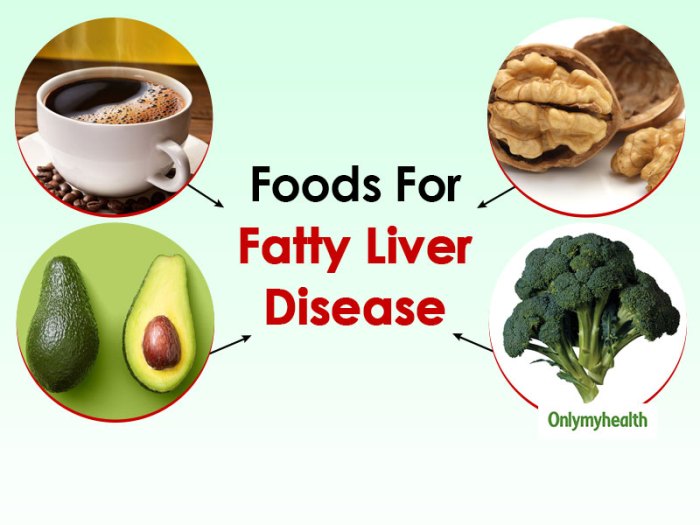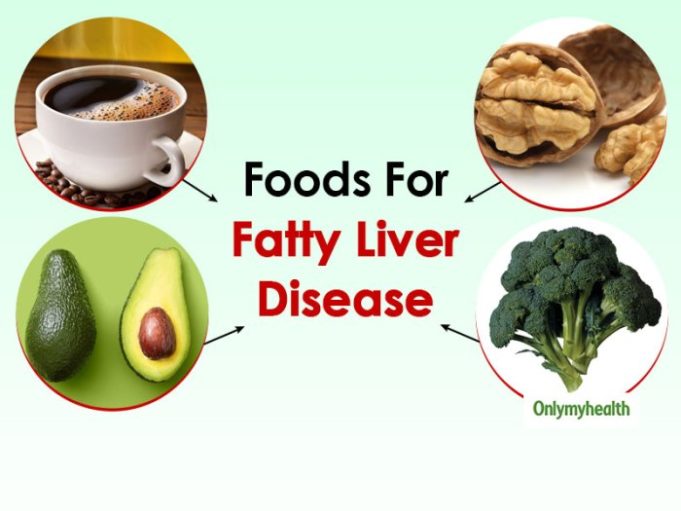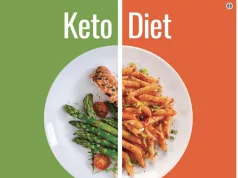What diet for fatty liver takes center stage as we delve into the world of managing this common liver condition. Fatty liver disease, often linked to lifestyle factors, can progress to more serious forms if left untreated. Understanding the role of diet in managing fatty liver is crucial for preventing complications and improving overall health.
This guide provides a comprehensive overview of dietary strategies tailored for individuals with fatty liver disease. We will explore the recommended dietary changes, including calorie restriction, weight management, and limiting unhealthy fats and processed foods. We will also discuss the benefits and risks of specific nutritional supplements, and provide sample meal plans that are both delicious and easy to follow.
Understanding Fatty Liver Disease

Fatty liver disease (FLD) is a condition where there is an excessive buildup of fat in the liver. It is a common condition that affects millions of people worldwide. There are two main types of fatty liver disease: non-alcoholic fatty liver disease (NAFLD) and alcoholic fatty liver disease (AFLD).
Types of Fatty Liver Disease
There are two primary types of fatty liver disease:
- Non-alcoholic fatty liver disease (NAFLD) is the most common type of fatty liver disease. It occurs in people who do not drink excessive amounts of alcohol. NAFLD is often associated with obesity, diabetes, and high cholesterol.
- Alcoholic fatty liver disease (AFLD) is caused by excessive alcohol consumption. It is less common than NAFLD but can be more serious.
Causes and Risk Factors
The exact causes of NAFLD are not fully understood, but it is thought to be related to a combination of factors, including:
- Obesity: Excess body fat can lead to the accumulation of fat in the liver.
- Insulin resistance: Insulin resistance is a condition where the body does not use insulin properly. This can lead to high blood sugar levels and an increased risk of NAFLD.
- High cholesterol: High levels of cholesterol can contribute to the buildup of fat in the liver.
- Genetics: Some people may be genetically predisposed to developing NAFLD.
- Certain medications: Some medications, such as corticosteroids, can increase the risk of NAFLD.
Potential Complications
Fatty liver disease can lead to several complications, including:
- Non-alcoholic steatohepatitis (NASH): NASH is a more serious form of NAFLD where inflammation and damage occur in the liver. It can lead to fibrosis (scarring) of the liver, cirrhosis, and liver failure.
- Cirrhosis: Cirrhosis is a serious condition where the liver becomes scarred and hardened. It can lead to liver failure and death.
- Liver cancer: People with NASH have an increased risk of developing liver cancer.
- Heart disease: NAFLD is associated with an increased risk of heart disease.
- Type 2 diabetes: NAFLD is often linked to type 2 diabetes.
Dietary Strategies for Fatty Liver
Making dietary changes is a crucial part of managing fatty liver disease. By adopting a healthier eating plan, you can improve your liver health and potentially reverse the condition.
Calorie Restriction and Weight Management
Maintaining a healthy weight is essential for managing fatty liver. Excess weight puts added stress on the liver, contributing to fat accumulation. Calorie restriction plays a significant role in weight loss and can help improve liver health. Losing even a small amount of weight can make a difference. Aim to lose 1-2 pounds per week through a combination of a balanced diet and regular exercise.
Limiting Saturated and Trans Fats, Sugar, and Processed Foods
These foods contribute to fat accumulation in the liver and can worsen fatty liver disease.
- Saturated fats are found in animal products like red meat, poultry with skin, butter, and full-fat dairy. Limit your intake of these foods.
- Trans fats are found in processed foods like cookies, crackers, and fried foods. Avoid these foods altogether.
- Sugar, including added sugars found in soda, candy, and desserts, can contribute to fat accumulation in the liver. Reduce your intake of sugary drinks and foods.
- Processed foods often contain high levels of saturated and trans fats, sugar, and salt. Choose whole, unprocessed foods whenever possible.
Food Recommendations for Fatty Liver
Here’s a breakdown of specific food groups and their role in managing fatty liver:
- Fruits and Vegetables: Aim for at least five servings of fruits and vegetables daily. They are rich in vitamins, minerals, and fiber, which can help improve liver function.
- Lean Protein Sources: Include lean protein sources in your diet, such as fish, poultry without skin, beans, lentils, tofu, and eggs. These provide essential nutrients without contributing to excess fat intake.
- Whole Grains: Choose whole grains over refined grains, such as brown rice, quinoa, oats, and whole-wheat bread. They are rich in fiber, which can help regulate blood sugar levels and improve liver health.
- Healthy Fats: Include healthy fats in your diet, such as those found in olive oil, avocados, nuts, and seeds. These fats can help improve cholesterol levels and reduce inflammation.
Nutritional Supplements and Fatty Liver
While a healthy diet and lifestyle changes are the cornerstone of managing fatty liver disease, some nutritional supplements might offer additional benefits. However, it’s crucial to remember that supplements should never replace a balanced diet and should always be taken under the guidance of a healthcare professional.
Vitamin E
Vitamin E is an antioxidant that may help protect liver cells from damage caused by free radicals. Some studies suggest that vitamin E supplementation might improve liver function in people with non-alcoholic fatty liver disease (NAFLD). However, more research is needed to confirm these benefits.
It’s important to note that high doses of vitamin E can increase the risk of bleeding, especially in people taking blood thinners.
Omega-3 Fatty Acids
Omega-3 fatty acids, found in fatty fish like salmon, tuna, and mackerel, have anti-inflammatory properties that may help reduce liver inflammation and improve liver function in individuals with NAFLD. Studies have shown that omega-3 supplementation can improve liver enzymes and reduce liver fat accumulation.
Green Tea Extract
Green tea extract contains catechins, which are antioxidants that may help protect liver cells from damage. Some studies suggest that green tea extract might improve liver function and reduce liver fat in people with NAFLD. However, more research is needed to confirm these benefits.
Milk Thistle
Milk thistle is a plant that contains silymarin, a compound that may protect liver cells from damage. Some studies suggest that milk thistle supplementation might improve liver function in people with NAFLD. However, more research is needed to confirm these benefits.
Sample Meal Plans for Fatty Liver
A well-balanced diet is crucial for managing fatty liver disease. These sample meal plans provide a framework for incorporating the dietary guidelines discussed earlier.
3-Day Sample Meal Plan
This sample meal plan offers a variety of options for breakfast, lunch, and dinner. It incorporates whole grains, lean proteins, fruits, vegetables, and healthy fats. Remember to adjust portions based on your individual calorie needs and consult with a healthcare professional or registered dietitian for personalized guidance.
Day 1
- Breakfast: Oatmeal with berries and nuts (1/2 cup rolled oats, 1/2 cup berries, 1/4 cup nuts)
- Lunch: Grilled chicken salad with mixed greens, avocado, and a light vinaigrette dressing (4 oz grilled chicken breast, 1 cup mixed greens, 1/4 avocado)
- Dinner: Baked salmon with roasted vegetables (4 oz baked salmon, 1 cup roasted vegetables like broccoli, carrots, and bell peppers)
Day 2
- Breakfast: Whole-wheat toast with avocado and a poached egg (1 slice whole-wheat toast, 1/4 avocado, 1 poached egg)
- Lunch: Lentil soup with a side of whole-wheat bread (1 cup lentil soup, 1 slice whole-wheat bread)
- Dinner: Turkey chili with brown rice (1 cup turkey chili, 1/2 cup brown rice)
Day 3
- Breakfast: Greek yogurt with fruit and granola (1 cup Greek yogurt, 1/2 cup fruit, 1/4 cup granola)
- Lunch: Quinoa salad with black beans, corn, and salsa (1 cup quinoa salad)
- Dinner: Tofu stir-fry with brown rice and vegetables (4 oz tofu, 1 cup vegetables, 1/2 cup brown rice)
Lifestyle Modifications for Fatty Liver: What Diet For Fatty Liver
Beyond dietary changes, incorporating lifestyle modifications is crucial for managing and potentially reversing fatty liver disease. These changes contribute to overall health and well-being, fostering a healthier liver environment.
Regular Physical Activity and Liver Health
Regular physical activity plays a significant role in improving liver health. Exercise helps reduce fat accumulation in the liver, improves insulin sensitivity, and promotes weight loss, all of which contribute to better liver function.
- Increased Insulin Sensitivity: Exercise enhances insulin sensitivity, allowing your body to use glucose more effectively. This reduces the amount of fat stored in the liver.
- Improved Liver Function: Physical activity can help improve blood flow to the liver, aiding in the removal of toxins and waste products. This contributes to overall liver health.
- Weight Management: Regular exercise promotes weight loss, which is crucial for managing fatty liver disease. Excess weight puts added strain on the liver, contributing to fat accumulation.
Recommendations for Exercise
- Moderate-Intensity Exercise: Aim for at least 150 minutes of moderate-intensity aerobic activity per week, such as brisk walking, swimming, or cycling.
- Vigorous-Intensity Exercise: Alternatively, engage in 75 minutes of vigorous-intensity aerobic activity per week, such as running or high-impact aerobics.
- Strength Training: Include strength training exercises at least twice a week to build muscle mass and improve overall fitness.
Stress Management and Sleep Hygiene
Chronic stress can contribute to fatty liver disease by increasing cortisol levels, which promotes fat storage in the liver. Adequate sleep is essential for liver health as it allows the body to repair and regenerate tissues, including the liver.
- Stress Reduction Techniques: Engage in relaxation techniques like yoga, meditation, or deep breathing exercises to manage stress levels.
- Prioritize Sleep: Aim for 7-8 hours of quality sleep each night. Establish a regular sleep schedule and create a relaxing bedtime routine.
Medical Management of Fatty Liver
While lifestyle changes are often the cornerstone of managing fatty liver disease, there are also certain medications that can play a role in addressing specific aspects of the condition. These medications are not a cure for fatty liver but can help manage symptoms, slow disease progression, and reduce the risk of complications.
Insulin Sensitizers
Insulin sensitizers are a class of medications that help improve the body’s response to insulin. Insulin is a hormone that regulates blood sugar levels, and in individuals with fatty liver, the liver may become resistant to insulin, leading to elevated blood sugar and increased fat accumulation in the liver. Insulin sensitizers work by making cells more sensitive to insulin, which can help improve blood sugar control and potentially reduce fat accumulation in the liver.
Metformin is a commonly prescribed insulin sensitizer for individuals with fatty liver disease.
Statins
Statins are medications that lower cholesterol levels in the blood. While statins are primarily used to manage high cholesterol, they may also have a beneficial effect on fatty liver disease. Research suggests that statins may reduce inflammation in the liver and improve liver function.
Statins are often prescribed to individuals with fatty liver disease who also have high cholesterol.
Antioxidants, What diet for fatty liver
Antioxidants are substances that protect cells from damage caused by free radicals. Free radicals are unstable molecules that can damage cells and contribute to inflammation. In fatty liver disease, oxidative stress (an imbalance between free radicals and antioxidants) can play a role in liver damage. Antioxidants can help reduce oxidative stress and potentially protect the liver from further damage.
Some antioxidants, such as vitamin E, have been studied for their potential benefits in managing fatty liver disease.
Regular Medical Monitoring
Regular medical monitoring is crucial for managing fatty liver disease. This involves routine blood tests, liver function tests, and imaging studies (such as ultrasound or MRI) to assess the severity of the condition and monitor its progression. Follow-up appointments with a healthcare provider allow for personalized treatment adjustments based on individual needs and response to therapy.
Final Thoughts
In conclusion, adopting a healthy diet plays a vital role in managing fatty liver disease. By making informed choices about what you eat, you can significantly improve your liver health and reduce your risk of complications. Remember to consult with a healthcare professional for personalized guidance and to address any specific concerns you may have. By embracing a balanced diet and incorporating other lifestyle modifications, you can take control of your health and live a longer, healthier life.
Q&A
What are the main causes of fatty liver disease?
The most common cause is non-alcoholic fatty liver disease (NAFLD), which is often linked to obesity, insulin resistance, and high cholesterol. Other causes include excessive alcohol consumption, certain medications, and genetic factors.
Can I reverse fatty liver disease with diet alone?
While diet is a crucial component of managing fatty liver, it may not always be sufficient to completely reverse the condition. In some cases, medication or other interventions may be necessary. It’s important to consult with a healthcare professional for personalized advice.
Are there any specific foods I should avoid with fatty liver?
It’s recommended to limit saturated and trans fats, sugar, and processed foods. These foods can contribute to inflammation and worsen liver health. Focus on consuming whole, unprocessed foods like fruits, vegetables, lean protein, and whole grains.
What are some good sources of protein for individuals with fatty liver?
Lean protein sources include chicken, fish, beans, lentils, tofu, and Greek yogurt. Aim for a balanced intake of protein to support liver function and overall health.
A healthy diet is essential for managing fatty liver, and that includes making sure you’re getting enough nutrients. But what about breastfeeding moms? You might wonder if it’s safe to diet while breastfeeding. It’s important to talk to your doctor about the best approach, as they can help you find a balance between your health and your baby’s needs.
Can you diet while breastfeeding ? The answer is that a healthy, balanced diet that includes plenty of fruits, vegetables, and whole grains is the best way to manage fatty liver and support both your and your baby’s health.
A diet for fatty liver often focuses on reducing overall fat intake and increasing fiber and nutrient-rich foods. If you’re looking to lose weight alongside managing fatty liver, exploring some of the top diets to lose weight can be beneficial.
However, always consult with your doctor or a registered dietitian to create a personalized plan that aligns with your specific needs and health goals.
A healthy diet is crucial for managing fatty liver, and while there are many resources available to help you determine the best approach, you might also wonder if a raw diet is beneficial for your furry friend. If you’re considering a raw diet for your dog, check out this article on is raw diet good for dogs to learn more about its potential benefits and drawbacks.
Ultimately, the best diet for your dog, and for managing fatty liver, will depend on individual needs and your veterinarian’s recommendations.
























